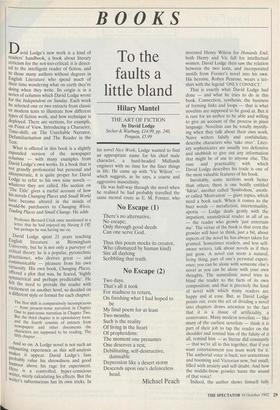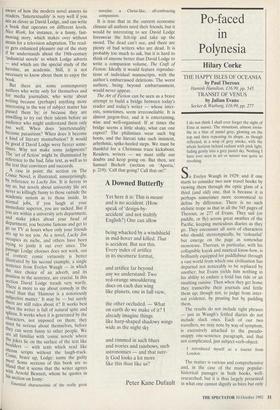BOOKS
To the faults a little bland
Hilary Mantel
THE ART OF FICTION by David Lodge Secker & Warburg, £14.99, pp. 240, Penguin, £5.99 David Lodge's new work is a kind of readers' handbook, a book about literary criticism for the not-too-critical; it is direct- ed to the intelligent reader of fiction, and to those many authors without degrees in English Literature who spend much of their time wondering what on earth they're doing when they write. Its origin is in a series of columns which David Lodge wrote for the Independent on Sunday. Each week he selected one or two extracts from classic or modern texts to illustrate how different types of fiction work, and how technique is deployed. There are sections, for example, on Point of View, Introducing a Character, Time-shift; on The Unreliable Narrator, Defamiliarisation and The Reader in the Text.
What is offered in this book is a slightly expanded version of the newspaper Columns — with many examples from David Lodge's own works. In a book that is not grandly professorial but personal and idiosyncratic, it is quite proper for David Lodge to refer to his own nine novels — Whatever they are called. His section on The Title' gives a rueful account of how his novels Changing Places and Small World have become altered in the minds of would-be purchasors to Changing Wives, Trading Places and Small Change. He adds
Professor Bernard Crick once mentioned in a letter that he had enjoyed my Having It Off, but perhaps he was having me on.
David Lodge spent 21 years teaching English literature at Birmingham University, but he is not only a purveyor of critical theory; he is a popular, pyrotechnic practitioner, who derives great — and communicable — 'pleasure from his own virtuosity. His own book, Changing Places, Offered a plot that was, he feared, 'highly sYmmetrical and perhaps predictable'. He felt the need to provide the reader with excitement on another level, so decided on a different style or format for each chapter:
The first shift is comparatively inconspicuous — from present-tense narration in Chapter One to past-tense narration in Chapter Two. But the third chapter is in epistolatory form, and the fourth consists of extracts from newspapers and other documents the characters are supposed to be reading. The fifth chapter ...
And so on. A Lodge novel is not such an exhausting experience as this self-analysis makes it appear. David Lodge's fans probably value his shrewdness and good humour above his rage for experiment. Here is a controlled, hyper-conscious wr■ter, nicely calculating his effects. But the writer's subconscious has its own tricks. In his novel Nice Work, Lodge wanted to find an appropriate name for his chief male character, a hard-headed Midlands engineer with no time for the finer things in life. He came up with `Vic Wilcox' which suggests, as he says, a coarse and aggressive masculinity.
He was half-way through the novel when he realised he had probably travelled the same mental route as E. M. Forster, who
invented Henry Wilcox for Howards End; both Henry and Vic fall for intellectual women. David Lodge then saw the relation between the two texts, and incorporated motifs from Forster's novel into his own. His heroine, Robyn Penrose, wears a tee- shirt with the legend 'ONLY CONNECT.'
That is exactly what David Lodge had done — and what he tries to do in this book. Connection, synthesis, the business of forming links and loops — that is what novelists are supposed to be good at. But it is rare for an author to be able and willing to give an account of the process in plain language. Novelists can be totally mystify- ing when they talk about their own work. Naive writers falsify and confabulate, describe characters who 'take over'. Liter- ary sophisticates are usually too defensive and snobbish to give out any information that might be of use to anyone else. The ease and practicality with which David Lodge describes his trade is one of the most valuable features of his book.
Inevitably, some sections work better than others; there is one boldly entitled `Ideas', another called 'Symbolism,' anoth- er called 'Motivation' — giant topics, which need a book each. When it comes to the buzz words — metafiction, intertextuality, aporia — Lodge deals gently with the impatient, unanalytical reader in all of us — the reader who growls 'just entertain me'. The virtue of the book is that even the growler will have to think, just a bit, about aspects of the novel he has always taken for granted. Sometimes readers, and less self- aware writers, talk about novels as if they just grow. A novel can seem a natural, living thing, part of one's personal experi- ence; you can be alone with someone else's novel as you can be alone with your own thoughts. The naturalistic novel tries to blind the reader to the facts of its own composition; and that is precisely the kind of novel with which many readers are happy and at ease. But, as David Lodge points out, even the act of dividing a novel into chapters draws attention to the fact that it is a tissue of artificiality, a contrivance. Many modern novelists — like many of the earliest novelists — think it is part of their job to tap the reader on the shoulder and remind him of the falsity of it all, remind him — as Sterne did constantly — that we're all in this together, that if you want entertainment you must work for it. The authorial voice is back; not sententious and booming and Victorian now, but small, filled with anxiety and self-doubt. And how the middle-brow growler hates the sound of that voice!
Indeed, the author shows himself fully
aware of how the modern novel annoys its readers. `Intertextuality' is very well if you are as clever as David Lodge, and can write a book that operates on different levels. Nice Work, for instance, is a funny, fast- moving story, which makes over without strain for a television adaptation. The read- er gets enhanced pleasure out of the story if he understands about the 19th-century `industrial novels' to which Lodge adverts — and which are the special study of the heroine, an academic. Still, it is not necessary to know about them to enjoy the book.
But there are some contemporary authors who write only for themselves and for media journalists, who write about writing because (perhaps) anything more interesting in the way of subject matter has passed them by; or because they are unwilling to try out their talents before an audience who might understand them only too well. When does Intertextuality' become parasitism? When does it become a kind of literary masturbation? It would be good if David Lodge were fiercer some- times. Why not make some judgments? The 'art of fiction' might be illuminated by reference to the bad, false text, as well as to the text that convinces and succeeds.
A case in point: the section on The Comic Novel, is illustrated, unsurprisingly, by reference to Lucky Jim. It is heresy to say so, but novels about university life are never so killingly funny to those outside the academic system as to those inside. In normal jobs, if you laugh at your Immediate superior, you are sacked. But if you are within a university arts department, and make jokes about your head of department, you become famous and get to go on TV at hours when only your friends are up to see you. As a novel, Lucky Jim occupies its niche, and others have been trying to jostle it out ever since. The Passage Lodge chooses does not work, out of context; comic virtuosity is better Illustrated by his second example, a single sentence from Evelyn Waugh — in which the nice choice of an adverb, and its position in the sentence, are crucial. In this section David Lodge treads very warily. There is more to say about comedy in the novel than that 'Humour is a notoriously subjective matter.' It may be — but surely there are still rules about it? It works best When the writer is full of natural spite and spleen. It works when it is generated by the characters, not imposed on them; they Must be serious about themselves, before they can seem funny to other people. We are all familiar with 'comic novels' where the jokes lie on the surface of the text like boulders — with texts which read like sitcom scripts without the laugh-track. Come, brace up, Lodge: name the guilty Men! Some sections of this book are so bland that it seems that the writer agrees with Arnold Bennett, whom he quotes in Ills section on Irony: Essential characteristic of the really great
novelist: a Christ-like, all-embracing compassion.
It is true that in the current economic climate all authors need their friends, but it would be interesting to see David Lodge foreswear the felt-tip and take up the sword. The dead can't sue, and there are plenty of bad writers who are dead. It is probably too much to ask, but it is hard to think of anyone better than David Lodge to write a companion volume, The Craft of Fiction. Ideally it would feature reproduc- tions of individual manuscripts, with the author's embarrassed deletions. The worst authors, being beyond embarrassment, would never appear.
The Art of Fiction can be seen as a brave attempt to build a bridge between today's reader and today's writer — whose inter- ests, sometimes, seem irreconcilable. It is almost jargon-free, and it is entertaining, wise and well-organised. If at times the bridge seems a little shaky, what can one expect? The philistines wear such big boots, and the literati take such insistent, arhythmic, spike-heeled steps. We must be thankful for a Christmas truce kickabout. Readers, writers — we must stifle our doubts and keep going on. But then, see Samuel Beckett (section on `Aporia,' p. 219): 'Call that going? Call that on?'"



























































 Previous page
Previous page